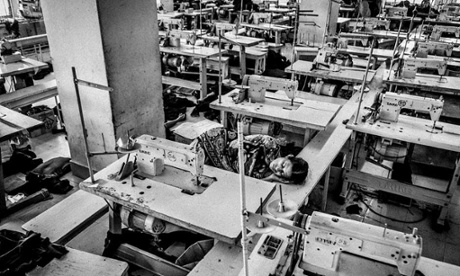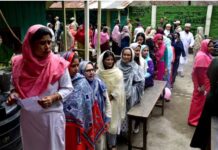Bangladeshi textile workers are on hunger strike over unsafe working conditions. For some, unable to feed themselves in the first place, it may be a strike to the death
After the Rana Plaza factory collapse in Bangladesh last year, when over 1,200 workers and many of their children died, and the Tazreen factory fire in November 2012, when around 130 workers died after management locked the exits, labour conditions for textiles workers had to be improved as a matter of life and death.
The Bangladesh accord on fire and building safety was established in the wake of these tragedies, after a tremendous international effort by activists, unions, led by the IndustriAll global union federation, and the International Labour Organisation.
Accord inspectors have been carrying out factory inspections since February with shocking findings: a large proportion of garment factories are unsafe, inadequately prepared for fire, structurally unsound, overloaded and under-constructed. Work is now been done to make those factories safe.
Yet the mistreatment and gross exploitation of Bangladeshi workers continues. For two weeks, 1,600 workers at factories owned by Tuba Group have been on strike and occupying their workplaces because they haven’t been paid since mid-May.
Hundreds of the workers are on hunger strike, and because many of them had been unable to feed themselves properly before the strike through lack of money, a large number have collapsed or been hospitalised. The extent of repression of Bangladeshi workers and the callousness displayed by factory owners and the government mean that workers are forced to make extreme sacrifices to make their point: for some, this may be a hunger strike to the death.
To add deep insult to profound injury, the Tuba Group owner happens to be the same man who owned Tazreen. It took over a year after the Tazreen fire to get him arrested but he has now used the strike to get bail.
On several occasions over the last two weeks, police and government and employer thugs have attacked protests in support of the strikes and on Wednesday they entered one of the occupied factories, beating and arresting union officials and activists.
The striking workers have called for a general strike on 10 August if their pay demands are not met.
Tuba Group has been making clothes for big western corporations like Walmart and during the World Cup completed an order of Fifa-endorsed clothing for European companies, as revealed by photographs of labels sent to us by striking workers.
People all over the western world were rightly disgusted that hundreds of innocent people, including children, were senselessly killed when MH17 was shot down. It is time for a similar outcry of disgust at the daily destruction of the lives of thousands of women, children and men in Bangladesh’s dark satanic mills.
The international garments industry, which gives people of the rich world an endless supply of cheap fashion, is in so many countries (with a small number of exceptions) based on the exploitation of workers.
The citizens of the rich world must say that they won’t wear clothes produced at the expense of the health, wellbeing and decent livelihood of workers like those in the Tuba Group factories. We want Bangladesh to have a garment industry and we want the Tuba Group workers and their millions of brothers and sisters to have jobs. But they must be decent jobs with decent pay. We in the rich world can afford to make sure they are – and we can insist that western fashion brands and their Bangladeshi suppliers agree.
To resolve the Tuba Group crisis we call on Fifa to ensure its licensed products are produced ethically. We call on the governments of the US, Britain, the EU and Australia to demand of the Bangladeshi government an end to the repression of workers and unions and the full payment of the Tuba Group workers’ wages.
Source: The Guardian










